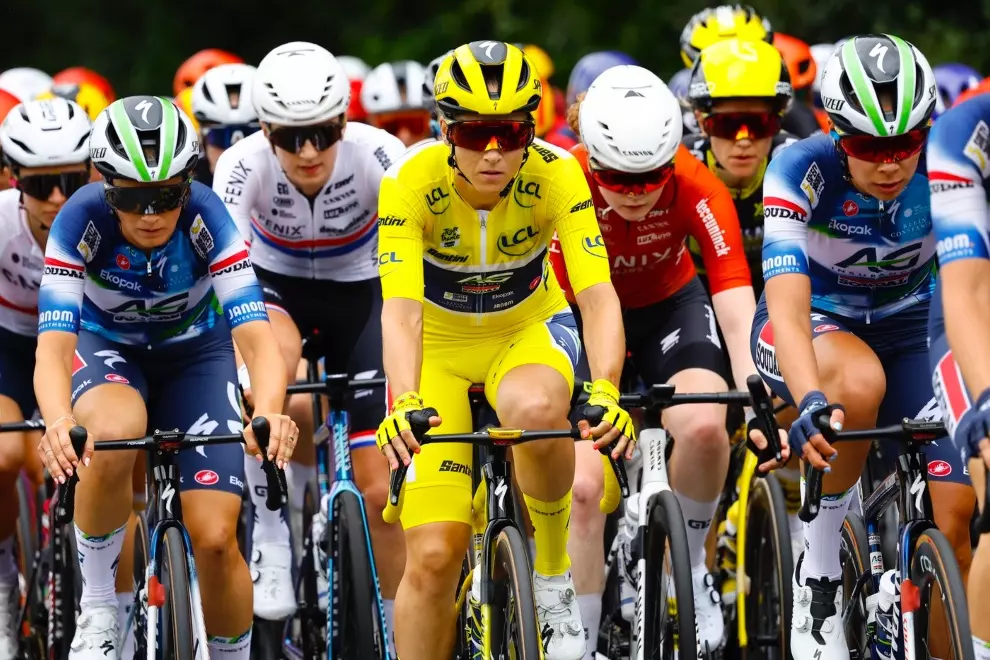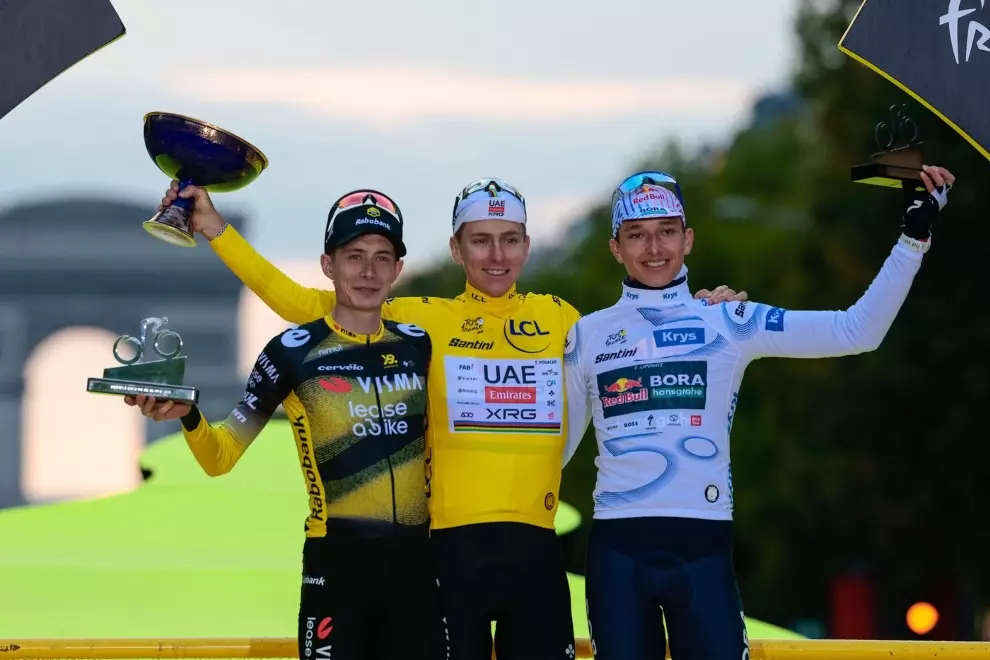Men’s Tour: A return to tradition and intense climbs
The men’s Tour de France will start in Lille and, unlike the previous year, will return to its traditional final stage in Paris, finishing on the Champs-Elysees. This change follows last year’s deviation to accommodate the Olympic Games in Paris. For the first time since 2020, the race will exclusively traverse French terrain.
The route features typical elements of the modern Tour with its flat early stages leading into the more challenging terrains of the Massif Central. However, the heart of the competition lies in the arduous climbing segments in the Pyrenees and the Alps. With two individual time trials, including an 11km mountain ascent on stage 13, this Tour is set to be another great one.
A pivotal moment in the race could occur over three consecutive stages in the Pyrenees. This segment includes a finish at Hautacam, where Vingegaard previously secured a crucial victory over Pogačar. The following stages feature a mountain time trial to Peyragudes and multiple challenging climbs ending at Luchon-Superbagneres. These stages are expected to be critical in determining the overall leader.
Northern France to Normandy
Stage 1: Lille Métropole – Lille Métropole, 185 km (Flat): This stage will be a high-speed introduction, suitable for sprinters aiming for an early lead.
Stage 2: Lauwin-Planque – Boulogne-sur-Mer, 212 km (Hilly): The longest stage of the tour featuring coastal winds and steep climbs towards the end, providing early drama and potential for shifts in the general classification.
Stage 3: Valenciennes – Dunkerque, 178 km (Flat): Another chance for the sprinters, though crosswinds could make the finale tricky and tactically interesting.
Stage 4: Amiens Métropole – Rouen, 173 km (Hilly): As the race moves through historic Normandy, the stage features a challenging route that could favour strong all-rounders.
Stage 5: Caen – Caen, 33 km (Individual Time Trial): A significant time trial around Caen, offering a flat, fast course that will be pivotal for GC contenders.
We asked former pro cyclist Zdeněk Štybar to share his thoughts on the route. “The first week will be intense, especially with the opening stage as a sprint. This setup will make it highly competitive and nerve-wracking as both the sprinter and overall classification teams will be pushing to stay at the front. I never liked when a Grand Tour begins with a sprint stage, because everyone pushes to the front, nobody wants to lose time, everyone wants to avoid crashes. It just makes things more nervous and dangerous.” Zdeněk noted.
Brittany to the Pyrenees
Stage 6: Bayeux – Vire Normandie, 201 km (Hilly): This rolling stage, packed with categorised climbs, will test the peloton’s endurance and could shake up the leader board.
Stage 7: Saint-Malo – Mûr-de-Bretagne Guerlédan, 194 km (Hilly): Featuring the iconic Mûr-de-Bretagne, where riders will face a challenging double ascent in the stage’s finale, often decisive for asserting dominance.
Stage 8 & 9 (Flat stages): These stages provide a brief respite before the high mountains, yet tactical racing and breakaway attempts could still offer excitement.
The decisive mountain stages
Stage 10: Ennezat – Le Mont-Dore Puy de Sancy, 163 km (Mountain): This stage on Bastille Day includes the Croix Morand and Croix Saint-Robert climbs, culminating at Puy de Sancy—promising a spectacular showdown.
Stage 12: Auch – Hautacam, 181 km (Mountain): A return to Hautacam, famous for epic Tour battles, could be pivotal for the GC contenders.
Stage 13: Loudenvielle – Peyragudes, 11 km (Individual Time Trial): This mountain time trial will be critical, with every second gained or lost on the steep slopes of Peyragudes potentially decisive.
Stage 14: Pau – Luchon-Superbagnères, 183 km (Mountain): Perhaps the queen stage, crossing the iconic Tourmalet and other severe climbs before a summit finish, could be where the Tour is won or lost.
Stage 16: Montpellier – Mont Ventoux, 172 km (Mountain): Another legendary climb, Mont Ventoux, will challenge the peloton with its harsh gradients and barren landscape.
Stage 18: Vif – Courchevel Col de la Loze, 171 km (Mountain): Featuring multiple brutal climbs, this stage concludes with a finish atop Col de la Loze, anticipated to be a decisive moment for the GC leaders.
Stage 19: Albertville – La Plagne, 130 km (Mountain): Another intense mountain stage, this could be the final battleground for the yellow jersey contenders before the race heads towards Paris.
“The general classification will really be decided here. Even if someone has a lead going in, a crisis on one of those days could cost them everything.” says Zdeněk.
These grueling stages ensure that even strong early performances might not be enough, as the overall outcome could hinge on a rider’s resilience in the final, mountainous terrain.
Final stages and Paris Finale
Stage 20: Nantua – Pontarlier, 185 km (Hilly): This penultimate stage, though classified as hilly, could see last-minute efforts from contenders to alter the GC standings.
Stage 21: Mantes-la-Ville – Paris Champs-Élysées, 120 km (Flat): The ceremonial final stage returns to its traditional sprint finish on the Champs-Élysées, concluding the 2025 Tour de France with pageantry and celebration.
Women’s Tour: From Brittany to the Alps
The Tour de France Femmes avec Zwift begins in Brittany and culminates in the Alps, covering nine days of competition. Will we see Kasia triumph again?
Stage 1: Vannes to Plumelec, 79 km – Hilly
The race kicks off in Brittany, starting in Vannes and finishing atop the Côte de Cadoudal in Plumelec. This stage, though short, features several climbs and will test the sprinters who can climb, setting an early tone for the yellow jersey competition.
Stage 2: Brest to Quimper, 110 km – Flat
Moving into Finistère, this stage is slightly hillier and could favor a strong breakaway group or punchy sprinters, especially with the uphill finish in Quimper that could rearrange the general classification early in the race.
Stage 3: La Gacilly to Angers, 162 km – Flat
The longest flat stage of this edition, from La Gacilly to Angers, offers a chance for sprinters to shine before the race heads into more challenging terrains.
Stage 4: Saumur to Poitiers, 128 km – Flat
Transitioning through the Loire valley, this stage provides yet another opportunity for sprinters, with only a mild climb to disrupt the pace before reaching Poitiers.
Stage 5: Jaunay-Marigny-Futuroscope to Guéret, 166 km – Medium Mountains
The race starts to escalate with this stage featuring the first significant climbs, culminating in a challenging finish in Guéret. This could be a day for the general classification riders to test their legs and gain some time.
Stage 6: Clermont-Ferrand to Ambert, 124 km – Mountain
This mountain stage introduces more severe challenges, with several climbs that will start to truly differentiate the strong climbers in the peloton. The descent into Ambert will require careful navigation.
Stage 7: Bourg-en-Bresse to Chambéry, 160 km – Hilly
As the race approaches the Alps, this hilly stage to Chambéry will be crucial for riders to maintain good positioning in the general classification, with multiple climbs and a tricky descent to finish.
Stage 8: Chambéry to Saint François Longchamp, 112 km – Mountain
Featuring the Col de la Madeleine, this stage is one of the highlights of the tour, reaching the highest elevation of 2,000 metres. The long, grueling climb will be a decisive moment for those vying for the overall win.
Stage 9: Praz-sur-Arly to Châtel, 124 km – Mountain
The final stage promises a dramatic conclusion to the Tour, with multiple tough climbs, including the Col de Joux-Plane. The finish at Châtel will not only challenge the climbers but also crown the overall champion after a demanding ascent.
This route for the 2025 Tour de France Femmes avec Zwift not only elevates the competitive level of women’s cycling but also ensures that the race will be a showcase of endurance, strategy, and climbing prowess. Who do you think will win? Let us know!




